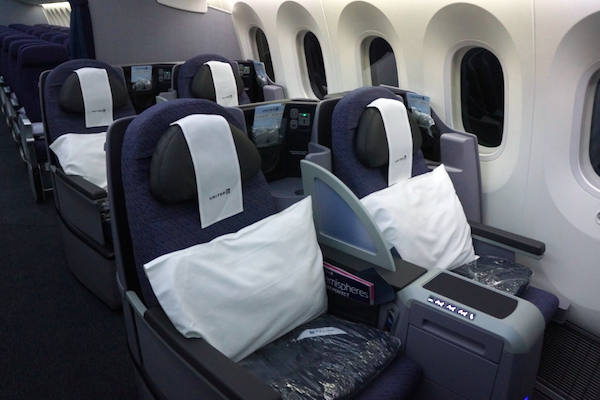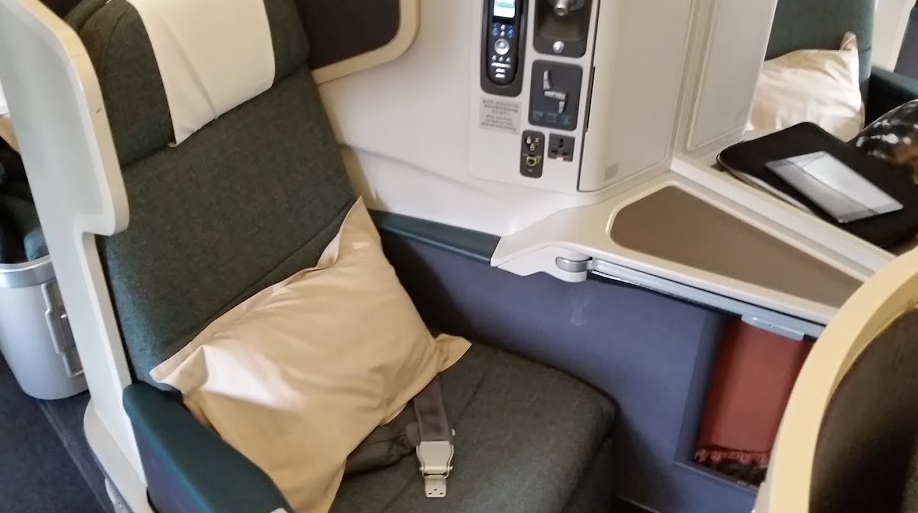Will Delta Create a New Mileage Currency to Restrict Access to Business Class?
With all the miles being printed by the banks, it’s only a matter of time until we hear about an airline experimenting with yet another currency targeted at only their elite passengers. And that will be the only way to redeem for a seat in front.

Delta: So innovative it hurts!
My money is on Delta. After all, they pioneered the concept of Mileage Qualifying Dollars and increasing the tiers of awards from 3 to 5 in 2015.
While my general view is that status is dead and have been advising friends, family and clients that they should just become a mileage free-agent — earning a ton of miles across all carriers to insulate themselves from devaluations and redeeming them on whichever carrier is the most convenient in a premium cabin.
The airlines have historically been great at removing perks for elites and even average flyers alike (like… food…) listening and “reintroducing” them as an “enhancement.” Why not eliminate the ability to fly business class and only make it attainable by redeeming MQM’s? The airlines have effectively beaten any loyalty out of us. I tell ardent United and Delta flyers trying to prequalify for Gold to look at their past treatment as a predictor of any future relationship. Most just land at silver and get a few credit cards on a Saturday. It’s easier.
With all the miles being minted by banks, there may be a breaking point. Brian Kelly, a.k.a. The Points Guy, speculates that there aren’t enough flights for all outstanding United miles to be redeemed without some expiring. So trading them in to buy MQMs/PQMs to access business class might be an idea they’d entertain. After all, Swiss and Air France both restrict first class redemptions to only elite members in their frequent flyer programs, at higher rates and with fuel surcharges no less.
Moreover, most flyers wouldn’t notice. A vast majority of redemptions (both in tickets and miles) are used for domestic coach awards, with international premium cabin redemptions accounting for less than 10% of all tickets. Our group isn’t hugely vocal or influential in the grand scheme of things.
Ok, so hopefully by now I’ve scared you. Because it’s really unlikely to happen.
Banks are Still in Control

Banks are typically way bigger and more influential businesses than airlnes. Makes for an unequal partnership when the airlines need financing.
Prima facie, writing down the value of miles, even garden variety devaluations, tend to piss off the banks that hold a large quantity of those miles. Chase is easily the biggest holder of United miles, AMEX the biggest holder of Delta miles.
Furthermore, redeemable miles are immensely profitable for the banks and the airlines, since they are buying up large tranches of distressed inventory (saving the airlines from rocky quarters or even bankruptcy from time to time). Keep in mind that a pittance of miles bought by a bank say $50M worth, is enough to swing an airline from the red to black in any quarter or year. Yes, they are capital intensive businesses, but airlines have also suffered from fairly unsophisticated leadership and are rounding errors compared to the level of sophistication of banks. Credit cards are big business, and promising a free flight sometime off in the future (that will likely get redeemed inefficiently LAX-LAS) is a promise they are more than willing to make.
Airlines are Horrible at Monetizing their Premium Cabins

Save your agony and credit miles to Singapore or TACA and use them to redeem on other Star Alliance partners. UA biz isn’t worth it!
If you fly enough with international carriers, you’ll notice that business class cabins are rarely full and that first class cabins at best are usually 50% full. The US carriers are a little better at monetizing those cabins due to system-wide upgrades and slightly less outrageous upgrade miles surcharges/lack of fuel surcharges (and more miles floating around), but reducing access to what is, by nearly all accounts, a competitively inferior product, is going to mean more seats going out empty.
There’s room for a whole discussion on “protecting” premium products and Gary has talked at length about silly notions that carriers are “protecting the exclusivity” of their product by letting half their seats go empty. Needless to say, having fewer people in the cabin is going to be a marginal improvement to those flying revenue tickets or super elites that would benefit. Intangible benefits don’t play well when the CFO needs dollars produced.
Furthermore, when Delta tried to better monetize the cabin by pulling complimentary upgrades, they ended up with lots of empty seats and irate Platinums and Diamond medallion flyers. Nobody was willing to pay the price they were charging and they have since relaxed the policy quietly.
Moving Too Far Creates More Opportunities for Competition at the Luxury and Discretionary Spender Levels.
I’ve met two types of groups that have opted out already. The first are those who are on the cusp between flying private or paid international business and first fares. They tend to laugh at airlines tripping over themselves to provide a decent meal and wine that didn’t come from Safeway (it’s RED wine, sir!), while using terms like “exclusive” and “valued”. Sure they have a ton of miles and spend them pretty loosely, paying double miles for last seat availability, and not usually in coach. But adding more hoops or roadblocks to booking is only going to drive these folks away, not towards the airlines.
These people are getting lured away from traditional carriers and inconvenient schedules and policies with new services like XOJet, Surfair (even La Compagnie, teething pains aside) and a few other time-sharing semi-private services out there. It’s not like these services have to even provide that much nicer of an experience, they just need to do less poorly with less hassle.
But airlines use business class and first class as the “illusion of luxury” to lure casual spenders like you and me to spend money with them too — for that extra trip to Florida to visit the family at the end of the year — in exchange for flimsy promises of recognition, some random number of upgrades between zero and every flight you take. You don’t know. Neither do they. I bet your estimations would be pretty far off though. Sure, getting a domestic upgrade is nicer than coach, but don’t expect it on Mondays, or Thursdays, or getting better food than what you’ll get microwaved at Olive Garden. It’s about promises far off in the future. The reality is I don’t get excited to fly US carriers anymore. It’s an experience to endure. I AM excited to fly folks like Cathay, Singapore and Emirates in ANY cabin.
But these changes drive people away that would have considered flying that additional amount. Now that Silver or Gold medallion is pulling up Kayak instead of Delta.com. People hitting even low and mid-tiers of status likely have considerably more discretionary income than your one off flyer. They take more trips and are actually tempted to pay for business class if the price is right (it rarely isn’t, see above). Changes restricting the opportunity to take a baby moon, or to go for a Michelin star dinner in town or pushing someone towards Southwest is not money in Delta’s pocket.
Competition internationally is increasing and credit cards are soon to follow

Cathay Pacific is happy to fly you to Asia (and hopefully eventually transcon). And you get to transfer Citi Thank you points to BA or CX, avoiding the need to interact with anyone at a US carrier.
This one is awesome. As US carriers degrade their programs, there are international carriers eager to snap up your business. In addition to credit cards being offered by BA, Korean, Asiana, LAN, TACA we’re seeing route network deployments never possible before. I can fly direct from SFO to Dubai, Abu Dhabi, Istanbul, half a dozen cities in Europe and even more in Asia, without even having to endure the hoops and hurdles of US carrier’s programs (and certainly not their products) anymore. They’re literally being cut out of the system. Hopefully consolidation will begin to put more pressure on regulators to review open skies agreements with European carriers. Domestically, I’ll spend my dollars and points with Virgin America and Southwest.
Congress is on our side (Scary, Right?)
Furthermore, for what it’s worth. Members of congress are frequent flyers due to the necessities of their jobs. While airlines gift them status, they tend to get ornery when changes in programs swing wrong for them. If access to business class was a product of spending, they may get more closed doors from phone agents. That bodes well for distributing gate slots and makes fortress hubs and airlines a nice scapegoat target. It’s not like politicians like to use populism and accusations of monopolistic “big business” to get elected.
Travel Hackers and Flyertalkers will always be able to outsmart their airlines
Lastly, this almost goes without saying, but the folks reading this (yes, you!) are inherently better at navigating the system than the airlines are at writing it. We’re also huge PR for them, positive and negatively, signing up credit cards and influencing a lot of people where to do their travel spending. While there’s whinging here and there when a change forces us to course correct, there are so many opportunities out there that hopefully even that headline didn’t scare you. 
Hope you enjoyed this thought experiment! Disagree? Comment below!

Maybe Delta will introduce another currency tier like the “SkyRuble”.
Haha love it!
Thank you for this post.
I fall smack-dab into the middle of the group “moving in the other direction”.
What good is Silver status on UA/DL if I never get any upgrades, and the rest of what Silver offers can be had with a credit card? If I’m stuck in the back of the plane anyways, I have a better experience on WN than UA/DL.
After redeeming a hefty number of miles for a RTW trip with my wife, we flew QR, IB, and CX in addition to AA and WN. Granted we were in business class, but my wife is now a convert to non-US airlines when traveling abroad - to the point that she’s accepted paying more for that if necessary.
So, if I’m flying non-US carriers internationally, and (being from a non-hub) I get more direct flights on WN and a better Y experience overall, then the legacy airlines have made my decision for me.
The legacies do not reward my low-level loyalty now, and are not concerned about investing in my loyalty now to ensure future loyalty as I travel more as my age and income advance. No problem. I’ll send my travel dollars to WN and out of the country to non-US carriers instead.
Well said, and as foreign carriers continue to fly more direct destinations to the US, they rely less on their US partners to funnel traffic, passengers get to see what a non-crappy airline is like and we have more choice and competition in the marketplace. I’ve noticed myself switching to Virgin America and JetBlue, with all of my United spend going to American this year. And I still have plenty of decades left in my customer lifetime value (after being 1K no less - I’ve seen the promised land and the milk and honey have already spoiled)
You’re forgetting the other group of people, which is far larger. Those who travel for work and not for leisure / hack / etc. Some are savvy, some are not, but they either don’t get a choice of carrier, a choice of route, or a choice of price - or alternatively they have policies that allow first/business on certain routes but are booked by an admin who really isn’t aware. It’s not at all about marginal cost for them, or fake luxuries… something all-to-often forgotten about by the travelhack blogosphere of peter pans.
I’m not sure what you mean? I traveled for work nearly continuously for 4 years as an M&A consultant (and knew each and every corporate travel policy out there), and many if not most of the other writers travel a fair amount for business. At the end of the day, regardless of why you’re traveling, knowledge is power. If you’re willing to take your lumps, not register for promotions, fly during peak times, not status match or are blindly flying what an admin is booking for you, I guess I don’t feel too bad that the airlines have you over a barrel.
Just to point you do not need to be elite to book swiss first, only need to use their points.
Awardadvocate
According to their official policy, you still do. http://www.miles-and-more.com/online/portal/mam/uk/program/news/detail?nodeid=1465420083&l=en&cid=1000243&WT.mc_id=MRSSP000 But (and let’s leave this in the comments) they have relaxed this policy likely due to their inability to monetize it. Someone from accounting probably ran down the hallway to the Miles & More desk and screamed “Why aren’t you getting SOMETHING for those empty seats!?” Not the brightest leadership in the bunch, no?
I can see them splitting the BIS miles and the CC miles into different buckets, available to be redeemed only in certain classes (which is what your article ultimately alludes to). They’ll not explain that, just do it before anyone realises.
CC companies will still be happy because they’ll still be able to give out points that can be redeemed (albeit for E or E+ only). They’ll then start giving out “premium points” for the more expensive cards, like Amex’s plat/centurion, not the branded or green/gold/blue cards for example. Those can then be redeemed for any seats - and those cards will be hard to use for MS… no 5X bonuses, gift cards don’t count, etc. After all, those card holders are the people who the airlines would like to see spending money getting into their front cabins with cash. Halo customers so to speak. Those who have the cash flow.
In a similar vein, airlines may start handing out miles redeemable only in the fare bucket you bought them - or lower. So an F ticket gives you miles for any seat, while an E ticket miles can only be used for E - not F.. but maybe J, to keep you happy and give a taste to spend more. Maybe. Though redemption prices would have to be heavily adjusted before that happens!
Having said all that, it’ll take a brave airline to stop giving out so many upgrades and start using the revenue to improve the product before we see the international carrier’s level of service. Their model works because they have a product worth spending on in the first place, and use that higher fare to fund it. If you want it, pay for it, and get the services that the money bought you.
Until domestic US airlines stop pulling people to the front to sell more economy seats and bolster that F/J product, NOBODY is going to spend on that product - which is why I believe Delta failed in their move to get there. It wasn’t worth the spend in the first place. Their domestic first still sucks as bad as everyone else they compete with. They did it wrong.
Great analysis! This was mostly just to push the thought bubble. Interesting to see if the cards will tier as well. Some airlines are finally rolling out upgrade auction mechanisms, which I think will solve a lot of the “protect the product” excuse airlines offer when asked why they can’t monetize forward cabins.
Spirit has made the pricing of domestic first class a joke and will drive down the price significantly as they roll out their 100+ new aircraft.
Completely agree. “Now that Silver or Gold medallion is pulling up Kayak instead of Delta.com. People hitting even low and mid-tiers of status likely have considerably more discretionary income than your one off flyer. They take more trips and are actually tempted to pay for business class if the price is right.” That is me. Most of my travel is for business. Fortunately, I get to make my own arrangements. Only rule: company pays only for economy. For domestic, I will fly the direct route, in economy. I may take a TOD, but no big deal if it is not offered. For international, I look for upgrades with miles at booking. Available roughly half the time. The rest of the time, I look for the cheapest business class, so long as it is a decent airline, and will accept certain connections over directs so long as I have backup plans to get there on time. And I will pay for those out of my own pocket. The result is that most of my flights are on two airlines. I am silver on one and gold on the other, but not intentionally. Then with club credit cards on top of that, I don’t really see the other loyalty perks (change fee waivers, etc.) as having enough impact to drive my decisions on who to fly.